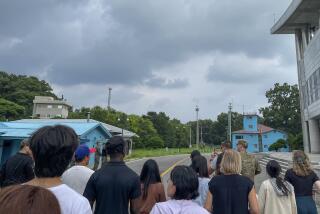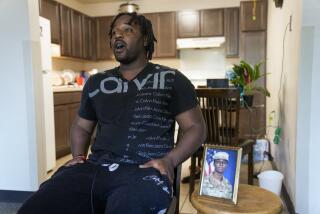Ex-GI’s Nephew Accuses U.S., Japan of Blocking Hospital Visit
- Share via
TOKYO — The nephew of alleged U.S. Army deserter Charles Robert Jenkins accused the U.S. and Japanese governments Saturday of keeping his uncle in isolation in a Tokyo hospital while they try to orchestrate a plea bargain that would “wash their hands” of an awkward diplomatic problem.
James Hyman, who is campaigning to exonerate his uncle on charges that he deserted the military and defected to North Korea nearly four decades ago, told reporters that the Japanese government had blocked his attempts to visit Jenkins in the last week.
Hyman said his uncle was probably unaware that “the U.S. government does not have proof” of the accusations against him. He suggested that he was kept away from Jenkins because “the Japanese government and the U.S. government believe I may say something wrong.”
The Pentagon has vowed to prosecute Jenkins, a 64-year-old former sergeant, for allegedly deserting his military unit while patrolling the demilitarized zone between North and South Korea in 1965, though officials say they are prepared to delay a court-martial until his health improves.
The Japanese government has called on Washington to show leniency so that Jenkins can remain with his Japanese wife, Hitomi Soga, and their two adult daughters in Japan.
Jenkins left North Korea on July 9 for medical treatment after spending nearly 40 years in the secretive communist state. He arrived in Japan a week ago, appearing far frailer than when he had left North Korea, and was immediately admitted to a hospital.
His ongoing hospitalization provides Tokyo and Washington with a slim window to resolve their clashing goals.
Quoting government sources, Japanese media reported Saturday that Tokyo and Washington were trying to cut a deal whereby Jenkins would plead guilty to desertion in return for permission to live in Japan. But Jenkins could balk at such a compromise if he knew how weak the Army’s evidence against him was, his nephew said.
Jenkins’ family has long maintained that he did not defect but was captured by North Korean soldiers and forced to participate in anti-American propaganda films to save his life. At the time of his disappearance, the Army said it had found four notes in which Jenkins confessed his intention to cross over to the enemy. Those notes have vanished from Army records -- if they ever existed, Jenkins’ family says, adding that the notes would have been forgeries in any event because they were signed “Charles” instead of “Robert,” as Jenkins is known to family and friends.
On the eve of Jenkins’ arrival in Japan, Hyman traveled to Tokyo from his North Carolina home with the help of a Japanese TV network. He said he hoped for a reunion with the uncle he has idolized but not seen since he was 4 years old.
Hyman said Japanese government officials initially told him that a hospital visit was impossible because Jenkins was in poor health and needed medical tests. But on Friday, Jenkins’ doctors told a Tokyo news conference that their patient’s health problems were not serious, saying he was suffering only from stress and fatigue.
Hyman said he then asked a senior Japanese official if he could call his uncle. But the official said he did not have the phone number, Hyman added.
Hyman said that after several days of pushing for access to his uncle, he was told Friday that he would be “locked up” if he tried to enter the hospital where Jenkins was being treated. He refused to say which official or government had made the threat.
Hyman also questioned why the Japanese government never delivered video messages, including one from Jenkins’ 91-year-old mother, and photographs sent recently by the Jenkins family.
The failure to deliver those items underscores how Jenkins’ presence in Japan, once sought so desperately by Tokyo, has become a burr in relations with Washington.
The Japanese government asked for the items in June, Hyman said, at a time when it was anxious to persuade Jenkins to leave North Korea and reunite with Soga in Japan. Soga is one of Japan’s revered clutch of “abductees,” civilians kidnapped by North Korean agents in the 1970s and ‘80s to teach Japanese to its spies.
The North Koreans released Soga -- without her family -- in 2002 after more than 23 years in the North, and there has been a national clamor in Japan to allow the family to stay together. Whether that is now possible depends on Jenkins’ legal status being resolved.
“If my uncle says he deserted, it will be in a plea-bargain way,” Hyman said Saturday, adding that Jenkins “will have a hard time doing it because he is a noble man.”
Hyman said his uncle was an American patriot who, as a short but feisty 15-year-old, lied about his age to get into the service and loved the Army so much that he tattooed the word on his arm.
“The United States government abandoned my uncle,” Hyman said. “My uncle did not abandon the United States.”
More to Read
Sign up for Essential California
The most important California stories and recommendations in your inbox every morning.
You may occasionally receive promotional content from the Los Angeles Times.













